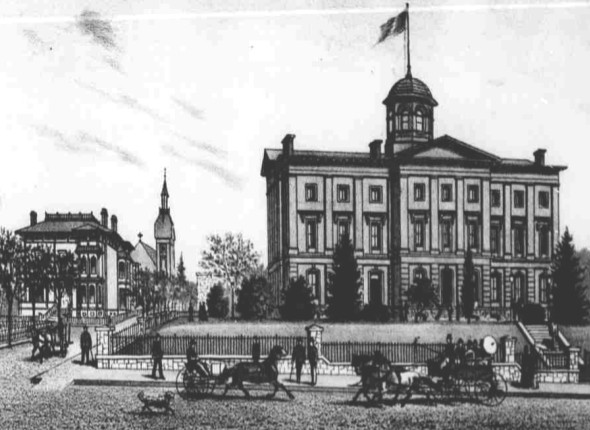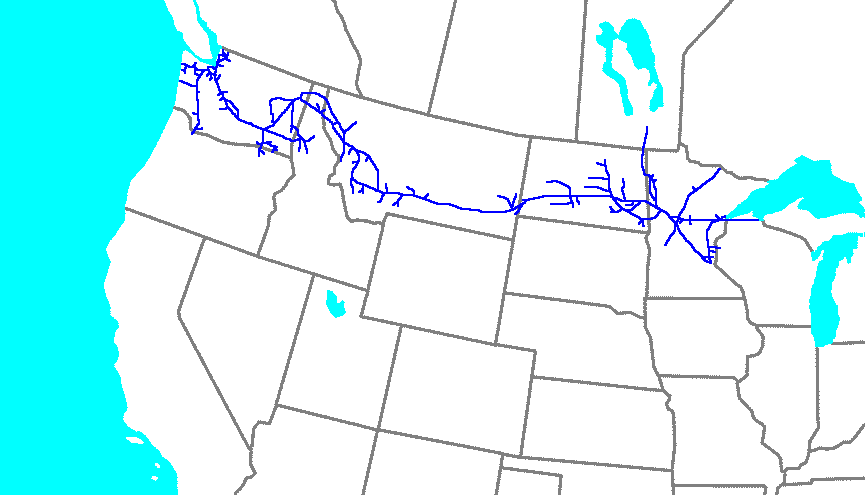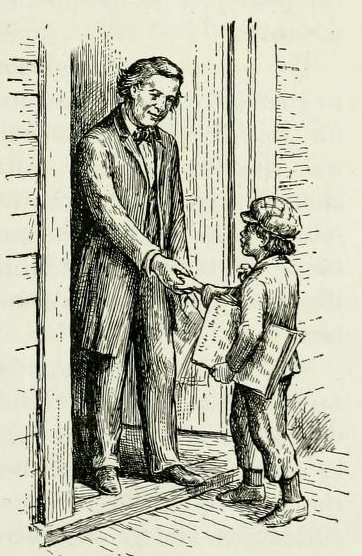|
Kalama, Washington
Kalama () is a city in Cowlitz County, Washington, United States. It is part of the Longview, Washington Metropolitan Statistical Area. The population was 2,959 as of the 2020 census. Etymology James W. Phillips' ''Washington State Place Names'' states, "General John W. Sprague of the Northern Pacific Railroad named the town in 1871 for the Indian word calama, meaning "pretty maiden." There is an additional story: The name "Kalama" was first mentioned in 1806 in the Lewis and Clark Journals ("Cath la haws Creek", "CalamsRiver", and "Calamas") in their reference to what is now known as the Kalama River columbiariverimages.com/Regions/Places/kalama.html (this story predates all of the others). Gabriel Franchère, in 1811, wrote of the Indian village at the mouth of the Kalama River, adding that it was called "Thlakalamah" . History Kalama was first settled by Native Americans, particularly members of the Cowlitz Indian Tribes. Others maintain that the town name is associate ... [...More Info...] [...Related Items...] OR: [Wikipedia] [Google] [Baidu] |
City
A city is a human settlement of a substantial size. The term "city" has different meanings around the world and in some places the settlement can be very small. Even where the term is limited to larger settlements, there is no universally agreed definition of the lower boundary for their size. In a narrower sense, a city can be defined as a permanent and Urban density, densely populated place with administratively defined boundaries whose members work primarily on non-agricultural tasks. Cities generally have extensive systems for housing, transportation, sanitation, Public utilities, utilities, land use, Manufacturing, production of goods, and communication. Their density facilitates interaction between people, government organisations, government organizations, and businesses, sometimes benefiting different parties in the process, such as improving the efficiency of goods and service distribution. Historically, city dwellers have been a small proportion of humanity overall, bu ... [...More Info...] [...Related Items...] OR: [Wikipedia] [Google] [Baidu] |
Gabriel Franchère
Gabriel Franchère ( 3 November 1786 – 12 April 1863) was a French Canadians, French Canadian author and explorer of the Pacific Northwest. Franchère was born in Montreal to Gabriel Franchère (4 March 1752 – 16 May 1832) and Marie-Félicité Morin (20 August 1760 – 28 September 1807). He later joined the Pacific Fur Company as a merchant apprentice, arriving at Fort Astoria on the ''Tonquin (1807 ship), Tonquin''. After Astoria was sold to the North West Company, Franchère returned to Montreal overland in 1814. He was employed for a time by John Jacob Astor in Montreal. He wrote ''Narrative of a Voyage to the Northwest Coast of America'', which was published in 1819. This work was translated into English and edited in 1851, and later re-released as part of the General Series of the Champlain Society in 1969. The untranslated version was one of Washington Irving's sources for his book ''Astoria''. The mountain Franchère Peak in the Canadian Rockies was named in his hon ... [...More Info...] [...Related Items...] OR: [Wikipedia] [Google] [Baidu] |
Portland, Oregon
Portland ( ) is the List of cities in Oregon, most populous city in the U.S. state of Oregon, located in the Pacific Northwest region. Situated close to northwest Oregon at the confluence of the Willamette River, Willamette and Columbia River, Columbia rivers, it is the county seat of Multnomah County, Oregon, Multnomah County, Oregon's most populous county. Portland's population was 652,503, making it the List of United States cities by population, 28th most populous city in the United States, the sixth most populous on the West Coast of the United States, West Coast, and the third most populous in the Pacific Northwest after Seattle and Vancouver. Approximately 2.5 million people live in the Portland metropolitan area, Oregon, Portland metropolitan area, making it the List of metropolitan statistical areas, 26th most populous in the United States. Almost half of Oregon's population resides within the Portland metro area. Named after Portland, Maine, which is itself named aft ... [...More Info...] [...Related Items...] OR: [Wikipedia] [Google] [Baidu] |
Goble, Oregon
Goble is an Unincorporated area, unincorporated community in Columbia County, Oregon, Columbia County, Oregon, United States. It is located on U.S. Route 30 in Oregon, U.S. Route 30 and the Columbia River. History The Goble area was most likely a stop for the Lewis and Clark Expedition. Goble was first settled by Daniel B. Goble in 1853. He took up a Donation Land Claim Act, donation land claim and later sold it to George S. Foster, who laid out a town and named it after Goble. Until there was a railroad bridge built across the Columbia River at Vancouver, Washington, Goble was the Oregon terminus for the train ferry to Kalama, Washington. Goble had a post office from 1894 to 1960. The history of the area is complicated because there are at five or six different community names applied to at least three locations in close proximity to each other all dating to about the same era. These names include: Hunters, Reuben, Goble, Mooreville, Red Town, Enterprise aka Enterprise Landing, ... [...More Info...] [...Related Items...] OR: [Wikipedia] [Google] [Baidu] |
Chinatown
Chinatown ( zh, t=唐人街) is the catch-all name for an ethnic enclave of Chinese people located outside Greater China, most often in an urban setting. Areas known as "Chinatown" exist throughout the world, including Europe, Asia, Africa, Oceania, and the Americas. The development of most Chinatowns typically resulted from human migration to an area without any or with few Chinese residents. Binondo in Manila, established in 1594, is recognized as the world's oldest Chinatown. Notable early examples outside Asia include San Francisco's Chinatown in the United States and Melbourne's Chinatown in Australia, which were founded in the early 1850s during the California and Victoria gold rushes, respectively. A more modern example, in Montville, Connecticut, was caused by the displacement of Chinese workers in New York's Manhattan Chinatown following the September 11th attacks in 2001. Definition Oxford Dictionaries defines "Chinatown" as "...a district of any non-Asian town, ... [...More Info...] [...Related Items...] OR: [Wikipedia] [Google] [Baidu] |
Main Street In Kalama, Washington, November 8, 1900 (KIEHL 268)
Main may refer to: Geography *Main River (other), multiple rivers with the same name *Ma'in, an ancient kingdom in modern-day Yemen * Main, Iran, a village in Fars Province *Spanish Main, the Caribbean coasts of mainland Spanish territories in the 16th and 17th centuries *''The Main'', the diverse core running through Montreal, Quebec, Canada, also separating the Two Solitudes *Main (lunar crater), located near the north pole of the Moon *Main (Martian crater) People and organizations *Main (surname), a list of people with this family name *Main, alternate spelling for the Minaeans, an ancient people of modern-day Yemen * Main (band), a British ambient band formed in 1991 *Chas. T. Main, an American engineering and hydroelectric company founded in 1893 *MAIN (Mountain Area Information Network), former operator of WPVM-LP (MAIN-FM) in Asheville, North Carolina, U.S. *Main Deli Steak House ("The Main"), a smoked-meat delicatessen in Montreal, Quebec, Canada Ships * '' ... [...More Info...] [...Related Items...] OR: [Wikipedia] [Google] [Baidu] |
Donation Land Claim Act
The Donation Land Claim Act of 1850, sometimes known as the Donation Land Act, was a statute enacted by the United States Congress in late 1850, intended to promote homestead settlements in the Oregon Territory. It followed the Distribution-Preemption Act 1841. The law, a forerunner of the later Homestead Act, brought thousands of settlers into the new territory, swelling their ranks along the Oregon Trail. 7,437 land patents were issued under the law, which expired in late 1855. The Donation Land Claim Act allowed white men or partial Native Americans (mixed with white) who had arrived in Oregon before 1850 to work on a piece of land for four years and legally claim the land for themselves. Along with other US land grant legislation, the Donation Land Claim Act discriminated against nonwhite settlers and had the effect of dispossessing land from Native Americans. History The passage of the law was largely due to the efforts of Samuel R. Thurston, the Oregon territorial del ... [...More Info...] [...Related Items...] OR: [Wikipedia] [Google] [Baidu] |
Northern Pacific Railway
The Northern Pacific Railway was an important American transcontinental railroad that operated across the northern tier of the Western United States, from Minnesota to the Pacific Northwest between 1864 and 1970. It was approved and chartered by the 38th Congress of the United States in the national / federal capital of Washington, D.C., during the last years of the American Civil War (1861-1865), and received nearly of adjacent land grants, which it used to raise additional money in Europe (especially in President Henry Villard's home country of the new German Empire), for construction funding. Construction began in 1870 and the main line opened all the way from the Great Lakes to the Pacific Ocean, just south of the United States-Canada border when Ulysses S. Grant, drove in the final "golden spike" completing the line in western Montana Territory (future State of Montana in 1889), on September 8, 1883. The railroad had about of track and served a large area, including ... [...More Info...] [...Related Items...] OR: [Wikipedia] [Google] [Baidu] |
Puyallup, Washington
Puyallup ( ) is a city in Pierce County, Washington, United States. It is on the Puyallup River about southeast of Tacoma and south of Seattle. The city had a population of 42,973 at the 2020 census. The city's name comes from the Puyallup tribe of Native Americans and means "the generous people" in Lushootseed. Puyallup is home to the Washington State Fair, the state's largest annual fair. The name of the city is also used in mailing addresses for adjacent unincorporated areas, such as the larger-populated South Hill. History The Puyallup Valley was originally inhabited by the Puyallup people, known in their language as the spuyaləpabš, meaning "generous and welcoming behavior to all people (friends and strangers) who enter our lands." The first white settlers in the region were part of the first wagon train to cross the Cascade Range at Naches Pass in 1853. Native Americans numbered about 2,000 in what is now the Puyallup Valley in the 1830s and 1840s. The fir ... [...More Info...] [...Related Items...] OR: [Wikipedia] [Google] [Baidu] |
Ezra Meeker
Ezra Morgan Meeker (December 29, 1830December 3, 1928) was an American pioneer who traveled the Oregon Trail by ox-drawn wagon as a young man, migrating from Iowa to the West Coast of the United States, Pacific Coast. Later in life he worked to memorialize the Trail, repeatedly retracing the trip of his youth. Once known as the "Humulus lupulus, Hop King of the World", he was the first mayor of Puyallup, Washington. Meeker was born in Butler County, Ohio, to Jacob and Phoebe Meeker. His family relocated to Indiana when he was a boy. He married Eliza Jane Sumner in 1851; the following year the couple, with their newborn son and Ezra's brother, set out for the Oregon Territory, where land could be claimed and settled on. Although they endured hardships on the Trail in the journey of nearly six months, the entire party survived the trek. Meeker and his family briefly stayed near Portland, Oregon, Portland, then journeyed north to live in the Puget Sound region. They settled at what ... [...More Info...] [...Related Items...] OR: [Wikipedia] [Google] [Baidu] |
Nisqually Tribe
The Nisqually are a Lushootseed-speaking Native American tribe in western Washington state in the United States. They are a Southern Coast Salish people. They are federally recognized as the Nisqually Indian Tribe, formerly known as the Nisqually Indian Tribe of the Nisqually Reservation and the Confederated Tribes of the Chehalis Reservation. The tribe lives on a reservation in the Nisqually River valley near the river delta. The Nisqually Indian Reservation, at , comprises 20.602 km2 (7.955 sq mi) of land area on both sides of the river, in western Pierce County and eastern Thurston County. In the 2000 census, it had a resident population of 588 persons, all in the Thurston County portion, on the southwest side of the Nisqually River. The tribe moved onto their reservation east of Olympia, Washington, in late 1854 with the signing of the Medicine Creek Treaty. As reaction to the unfairness of the treaty, many members of the tribe led by Chief Leschi engaged and were ... [...More Info...] [...Related Items...] OR: [Wikipedia] [Google] [Baidu] |
Kalama
Kalama Hakaleleponi Kapakuhaili (1817 – September 20, 1870) was a Queen consort of the Kingdom of Hawaiʻi alongside her husband, Kauikeaouli, who reigned as King Kamehameha III. She chose the baptismal name Hakaleleponi after the Biblical figure Hazzelelponi. Her name Kalama means "the torch" in the Hawaiian language. Early life She was the only child of Kona chief Naihekukui, who was commander of the native Hawaiian fleet at Honolulu. Her mother was Chiefess Iʻahuʻula, the younger sister of Charles Kanaʻina. Kanaʻina would become ''hānai'' (Hawaiian form of adoption) parent of the child. Marriage The young Kamehameha III, the boy king at the time, was needing a suitable royal bride. Many of the traditional chiefs wanted a union between the king and his sister Nāhienaena, as had been customary in the Hawaiian court since its beginning; however, the Christian missionaries and chiefs, who held significant political power, opposed this suggestion, calling it inc ... [...More Info...] [...Related Items...] OR: [Wikipedia] [Google] [Baidu] |









